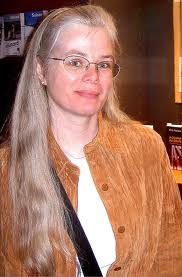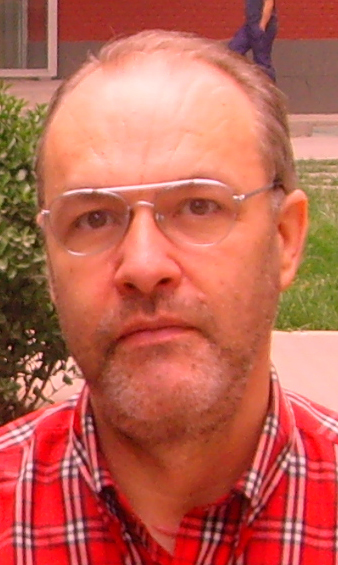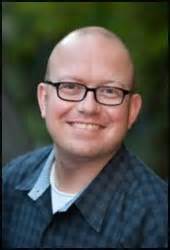 Hugo nominee, Nebula nominee, Campbell nominee, Writers of the Future winner, and Analog regular Brad Torgersen talks with Diabolical Plots about his journey as a writer, the blue chip veterans who mentored him, and his hopes for the Society Advancement of Speculative Storytelling.
Hugo nominee, Nebula nominee, Campbell nominee, Writers of the Future winner, and Analog regular Brad Torgersen talks with Diabolical Plots about his journey as a writer, the blue chip veterans who mentored him, and his hopes for the Society Advancement of Speculative Storytelling.
CARL SLAUGHTER: Did you write the proverbial one million words before you got published in Analog? Before you won Writers of the Future?
BRAD TORGERSEN: Just about. When I won the Writers of the Future Contest I sat down and added up everything I’d written to date, and all totaled it came out to be roughly 850,000 unpublished words. So in my case I feel the “first million words” really were an accurate gauge. I know this also goes by the 10,000 hour rule. And I think it’s true. Fledgling and/or aspiring writers need to understand that it can take a lot of work and time to reach what more or less passes for entry-level professional quality. That’s not a bad thing, really. Almost anyone desiring to do a thing professionally,especially an artistic thing,needs to put in his or her practice.
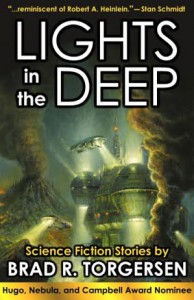 CS: Do you have a first reader?
CS: Do you have a first reader?
BT: No. I have in the past used an exclusive reader group. But for the last two years virtually everything I’ve written and sold has gone through one and only one first reader: my editor(s) at Analog magazine, Baen books, etc. I know some writers swear by their first readers. Me? I fly solo these days, and do so knowing that I have only myself to trust when I am sculpting the stories. It’s a little unsettling, until I get that next acceptance letter in my e-mail. Then I breathe a sigh of relief and remember something I like to tell new writers: the point of a writing group or a first reader is to not become dependent on the writing group or the first reader. Your objective should be to eventually get proficient enough to send directly to editors without fretting about whether or not the story has what it takes to impress an editor.
CS: Do you use workshops?
BT: I have used several different workshops over the last five years. The first one I ever did was called the “Kris and Dean Show” and it was a weekend event hosted by Kristine Kathryn Rusch and Dean Wesley Smith out in Lincoln City, Oregon. “The Kris and Dean Show” was a kind of two-day crash course in how publishing works, and it really knocked my socks off at a time when I was struggling a great deal, and wondering if I would ever become good enough to sell even one story, much less the many stories and book I’ve since sold. I liked the “Kris and Dean Show” so much, I went back (after I won Writers of the Future) to do Kris and Dean’s short story workshops, and a novel pitch/packaging workshop. I sold all of the stories I did for the short story workshops (two of which got covers, and one of which was nominated for both a Hugo and a Nebula) and the novel pitch/package workshop was hugely valuable. Needless to say, I am not just a fan of the workshops in Lincoln City, I am a friend of Kris and Dean now too. Lovely, wonderful people.
Speaking of which, I’ve also done Dave Wolverton’s “Million Dollar Outlines” workshop. Which, combined with the Kris and Dean novel workshop, helped prepare me to sell to the book-buying world. Having cut my teeth and proven my worth at short fiction length, I really wanted to zero in on some stuff for my books. I knew the skillsets for writing at book length were different from writing short stories, and I really needed help putting my brain through the outlining process. Because I am a “seat of the pants” man for short fiction. But, having lost several older books to this method in the past, I didn’t want to lose any more books. So I appealed to Dave for help, and his week-long workshop was amazingly informative. Dave’s really got his pulse on the underlying emotional and “legendary” aspects of storytelling. Perhaps more than anyone I’ve ever seen, as writers like Brandon Sanderson (a student of Dave’s) might attest.
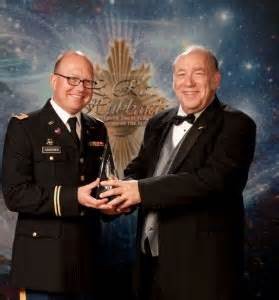 And of course, there is the Writers of the Future workshop itself; which is free to all winners of the Contest, and puts a new writer through his or her professional paces. The best benefit I can think of from Writers of the Future was the networking: being able to meet and talk to all these very-successful and award-winning authors. In an intimate setting. Often for hours and hours. I not only left the workshop with numerous contacts in the industry, I eventually became good friends with many of the judges, such as Kevin J. Anderson, Eric Flint, and especially Mike Resnick; the last having become like a father to me in the business.
And of course, there is the Writers of the Future workshop itself; which is free to all winners of the Contest, and puts a new writer through his or her professional paces. The best benefit I can think of from Writers of the Future was the networking: being able to meet and talk to all these very-successful and award-winning authors. In an intimate setting. Often for hours and hours. I not only left the workshop with numerous contacts in the industry, I eventually became good friends with many of the judges, such as Kevin J. Anderson, Eric Flint, and especially Mike Resnick; the last having become like a father to me in the business.
One thing about workshops: there are workshops for craft, and there are workshops for business. Be sure what you want to do (and where you need the emphasis most) before you sign up. Kevin J. Anderson (along with Dave Wolverton, Brandon Sanderson, Rebecca Moesta, Eric Flint, and several others) runs a stupendously useful and very fun professional business workshop called Superstars Writing Seminars. I took the three-day course at Kevin’s encouragement, following my stint in L.A. for Writers of the Future, and I found Superstars to be chock full of valuable writing business advice, anecdotes, cautionary tales, and encouraging news. A top-notch workshop if I do say so myself; excellent for those writers who, having published a bit, are wanting to bump up to the next level and really start making money.
CS: How many times do you revise the same story?
BT: I used to endlessly revise my stories to death. It was what I thought you had to do to become a pro. Dean Wesley Smith disabused me of that notion in 2008-2009 and it paid off: I won Writers of the Future, and have not looked back since. Now I give myself roughly three passes through a thing: the initial creative pass, a second pass to check for consistency problems and emotional impact, and a final pass for fine-tooth-comb stuff like spelling and grammar and occasional sentence or word changes. After that . . . I am done. I know the story or book is as good as I can possible make it (in that particular time and place) and I need to get the story out to the editors, and begin working on something new. If I let a story linger too long, and go for even more passes, I always have a bad time of it. Always. So I try to make sure I don’t get cold feet. I grow more as a writer working on new work than I ever do endlessly “fixing” old work. I think many writers are the same way, but we’ve all been taught this myth that exhaustive revision is the only way to be good. I think it’s not so.
CS: Do you write an outline, character profiles, etc?
For short fiction? Almost never. For books? I lost six books writing by the seat of my pants, and swore I’d never do it again. I went and sat at the feet of professionals with dozens and dozens of novels to their credit, and forced myself to learn how to outline. I used to think working with an outline was stifling and would kill the creative juice of the story. But I was wrong. An outline (for book length) is the only way I personally know how to do something that long, and not get lost in the sub-plots, let the small characters grow and take over the big characters, etc. Outlines can be anywhere from a few pages, up to as much as 50 pages. Depends on how much world building and character development I want to do before I actually begin writing the prose. And there is always a *lot* of that behind-the-scenes stuff that doesn’t wind up in the book verbatim. Because while I may need to know a character’s eight-paragraph bio in order for her to make sense to me in the overall plot, the reader may only need to know a few details dispersed here and there; as the action moves along.
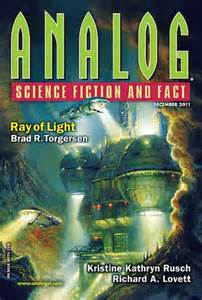 CS: Are most of your stories primarily premise-oriented, character-oriented, plot-oriented, or theme-oriented?
CS: Are most of your stories primarily premise-oriented, character-oriented, plot-oriented, or theme-oriented?
BT: All of the above. I have written stories based purely on a suggestive title, a nugget of a plot, a single interesting character premise, or a theme that’s rolling around in my head and which I want to explore. Usually I wait for two or three of these things to collide in my unconscious before I decide I have enough material to put together an interesting and engaging story. One of my best-known stories, a novelette called “Outbound,” actually began as a kludging-together of two previous stories which had, on their own, failed to gel. One of them had a good theme and a decent plot, but no compelling character or situation. The other had a compelling character and situation, but no theme or plot. Throwing these elements from these separate stories together, and making a brand new story from the bones of the old, made all the difference.
CS: Do you make major changes at an editor’s request or hold your ground?
BT: I am easy-going. Toni Weisskopf, Stan Schmidt, Edmund Schubert, Bryan Thomas Schmidt, Trevor Quachri, they all have valuable feedback, and there is almost never a time when I can’t improve a story with some experienced feedback from the editor. That’s what they’re there for, after all. And no editor, especially book-buyer like Toni, ever gets a book from a new author which cannot use at least some commentary and feedback. I look at it like a perpetual learning process, and as long as the editor seems to see the same (more or less) story that I am seeing (and this is almost always the case) then I am perfectly happy making whatever changes work best. Or which might be required to take a decent story, and make it into a good story. Or take a good story, and make it into a great story.
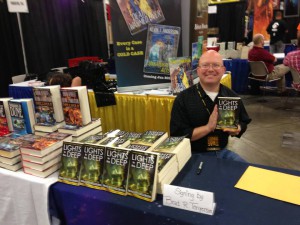 CS: How many stories has Analog bought and how many have they rejected?
CS: How many stories has Analog bought and how many have they rejected?
BT: Before Stan Schmidt bought “Outbound” in January 2010, he had rejected two or three dozen previous stories. Since then Stan (and his successor, Trevor Quachri) have bounced a tiny handful. All of which found their way to homes with other markets. One of the nice things about cracking the professional glass and gaining entry-level proficiency as a story teller, when a story gets rejected these days, it’s almost always a matter of taste for a given editor; someone else (with a different taste) will almost always like the story and pick it up. I often go to Analog with my stories first because Analog’s needs so closely match my particular style and content; of story subject, theme, protagonists, etc. But not always. Analog has taken things other editors could not use, and vice versa. Again, a perk of being pro level.
CS: Now that Analog has a new editor, will the magazine, or you, have a fundamental shift in MO?
BT: Nope. I’ve sold two big stories to Trevor Quachri (“The Chaplain’s Legacy” was a massive novella, and “Life Flight” was a substantial novelette) which I believe would have easily sold to Stan Schmidt when he was editing. In fact when Stan Schmidt did the intro for my short story collection LIGHTS IN THE DEEP he noted that his wife had already read “The Chaplain’s Legacy” in the magazine, and gave it very high marks. And he tends to trust her taste, so I think Analog and I will continue to have a mutually beneficial relationship. It’s a lot of fun being able to publish in such a well-known and venerable magazine. I am pleased that Analog’s readers have continued to respond so well to my work. I hope that’s always the case, and I endeavor with each story I send to Analog to match the bar I set for myself with the last Analog publication.
CS: How long is the “Unpublished But Hopeful Stories by Brad Torgersen” list?
BT: Difficult to gauge, as I generally have several dozen ideas rolling around in my head at any one moment. I have on occasion gone back to the “trunk” an unearthed an old story which got rejected at all the markets previously, then reworked the story from the ground up, and sold it contemporarily. In those cases it’s a total rebuild, almost always using the character or the idea as the skeleton around which the new, re-drafted (Dean Wesley Smith’s phrase) story takes shape.
DP: Do you anticipate ever breaking into novels? Anthologies? Editing? Full time sci fi work?
BT: Full-time writing would be great, but give the vagaries of the marketplace and the needs of my family, it remains to be seen if full-time ever becomes truly feasible. I have spoken to several of the elder statesmen in the Utah spec fic writing community, and among them is a fellow named L.E. Modesitt, Jr. who says full-time writing (pre-retirement) isn’t even a necessary goal, as long as I keep putting the hours in at night and can produce fresh work on a regular basis. So, for now, I live with late nights. Yes, I’ve sold my first novel, a “fix up book” (in the vernacular of Mike Resnick) called THE CHAPLAIN’S WAR to Baen Books. It’s based on my two Analog stories “The Chaplain’s Assistant” and “The Chaplain’s Legacy,” both of which appeared in print previously. I’ve had several stories reprinted, and have also put fresh work into anthologies on request from the editors. I am not sure I can afford the time to edit right now. Though if a choice editorial opportunity came along (and I felt it was my chance to really make a statement and/or affect the field) I might try to take it. But only provided that I could work it in with my other jobs: full-time healthcare nerd, part-time Army Reserve soldier, and night-time sci-fi writer.
CS: Give us the background on Society for the Advancement of Speculative Storytelling?
BT: Lou Antonelli came to me shortly after I broke into print, and he proposed the idea that the spec fic community needed a new organization that could not only focus on bona fide advocating for established authors, but which might also help foster the growth and development of aspirants as well. Now, I knew then as well as anyone the heartache of the aspirant, and I like a lot of what Lou had it mind, so I signed on. Unfortunately, because my three jobs still have to take precedent, I wasn’t able to do much more for SASS at the start, than serve as a hood ornament Vice President while Lou got the word out and tried to attract new members. I think SASS is definitely something that will gain speed and momentum over time, whether I am able to lend it much credibility or not. Right now I am a dues-paying member and I like (again) what Lou is trying to do with the organization. Spec fic really could use a group capable of bona fide professional advocacy, combined with grass-roots growing and fostering of new talent. Too often sometimes (at least in my perception) the existing bod(ies) get tangled up in personality disputes or political bickering that’s got nothing to do with anything important to me as a professional. Can SASS be the answer? I would certainly like to think so. I hope Lou continues to gain traction and that SASS moves forward.
 Carl Slaughter is a man of the world. For the last decade, he has traveled the globe as an ESL teacher in 17 countries on 3 continents, collecting souvenir paintings from China, Korea, Thailand, Vietnam, and Egypt, as well as dresses from Egypt, and masks from Kenya, along the way. He spends a ridiculous amount of time and an alarming amount of money in bookstores. He has a large ESL book review website, an exhaustive FAQ about teaching English in China, and a collection of 75 English language newspapers from 15 countries.
Carl Slaughter is a man of the world. For the last decade, he has traveled the globe as an ESL teacher in 17 countries on 3 continents, collecting souvenir paintings from China, Korea, Thailand, Vietnam, and Egypt, as well as dresses from Egypt, and masks from Kenya, along the way. He spends a ridiculous amount of time and an alarming amount of money in bookstores. He has a large ESL book review website, an exhaustive FAQ about teaching English in China, and a collection of 75 English language newspapers from 15 countries.
His training is in journalism, and he has an essay on culture printed in the Korea Times and Beijing Review. He has two science fiction novels in the works and is deep into research for an environmental short story project.
Carl currently teaches in China where electricity is an inconsistent commodity.

